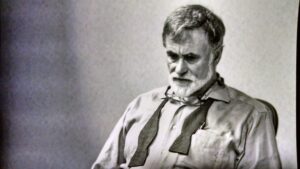“Let Him Grieve”
Dear Nicholas, Three words of advice from you about twenty-five years ago popped into my head one night last week. And they were just what I needed to hear: “Let him grieve.”
The Loss
Husband Bob has been dealing lately with both being retired from work he loved for 55+ years and with the limits and frustrations created by his many medical adventures.

Bob in a pensive moment years ago
His work as a psychologist seeing patients provided much contact with people and intellectual stimulation. He worked until he was a few weeks short of 82. In the nine months since, though often lacking energy to be back at work, he misses much about it.
No Satisfying Replacement
His current hobbies are mainly his voracious reading and taking care of two large dogs. But nobody can read day and night, not even grad students. And these activities hardly replace seeing many patients a day. They also provide less distraction from physical discomfort and problems.
So he frequently seems tired and out-of-sorts. And he doesn’t want to make the effort to go places and stir up new activities. One recent example: I asked if he wanted to ride over to a shopping center with me to get a birthday present. Only half-jokingly, he said, “No, I hate travel.”
Hate Travel?
My impulse is to encourage trying out new activities: I keep picturing him playing chess outdoors in a city park. I’ve had to resist lecturing on the power of positive thinking,
And then on the recent weeknight as I was crossing a threshold in our house, moving from one room into another, I thought, “Let him grieve.”

You said that to me, Nicholas, about another matter years ago when Bob and I were about 50 and 57. I don’t think I’d thought of it since then. Now it feels the perfect response to our situation. I do not need to make cheerful suggestions, provide distracting entertainment, come up with fun new hobby ideas, or perform any cheerleader functions. That’s not what he needs from me. And for me, it’s a relief to let that go.
And so I don’t fight his sad and pessimistic mood, I let him grieve. I let him be. The instant I remembered that advice it felt profoundly right to me. So thank you again.
Peggy
Categories: conscious choices, Uncategorized
Tags: being retired, d out-ofneeded to hear, hate travel, I let him belacking energy, limits and frustrations, power of positive thinking, tired an-sorts, words of advice, work as a psychologist, work he loved



Comments
Funny how old lessons creep into our consciousness ( or maybe enter with a bang) when we least expect it. I agree…we all need time to grieve.
I don’t think I’ve had it happen often, Judy. Either I learn and it sticks or it simply goes away and only comes back because of something I read. For me, this was unusual. Grief is sure a subject you know plenty about.
Time for grief matters so much. I’ve learned this again going through cancer surgery and removal of a kidney. I can’t tell people I’m grieving a body part. But I am.
Your husband has a treasure in a wife who gets it.
Thank you, Gail. It took me a while to get it. And I do understand grieving loss of a kidney. I felt robbed when I lost a back tooth.
Bob taught me so much about grieving in our group at Holly Hill. The aging process presents much loss and both little and big grief. You are so right that we have to not only let them grieve, but also let ourselves grieve. Namaste to you and Bob. Gail Waters
Just read your comment to Bob who said, “She’s a good person.” Thanks for this thoughtful response, Gail.
As someone aged 73 who has sold his business and now is struggling to find the meaning and purpose in my life that work once provided, I find this essay very interesting.
I do sympathize, Henry. “Typing” is so much of the core of my being. BTW, congratulations on the sale of your business. That seems to me a very large accomplishment. And I’m guessing that some form of activism that includes “typing” will arise for you. Good luck with all of this. It’s indeed a challenge.
I will remember this wise advice as my husband copes with his Parkinson’s, grieving the loss of so much that has made his life dynamic and purposeful. On his “good days,” he writes and reads and ties beautiful flies that he knows he will probably never cast. On his “down” days, I will try to put aside the cheerleader role and let him grieve. Thank you!
I’m sorry y’all have this to deal with, Polley. I know it’s an especially tough disease. May you both have many good days. And there really is some ease and relief that comes from dropping the need to cheerlead.
Peggy, your post on grieving raises for me the question whether I am somehow averse to grieving, or the question whether my way of grieving is somehow quieter, more peaceful than the kind of grieving I pick up on in your post (or in the comments preceding mine). One thing I’ve noticed about myself over the years (many years) is that I seem to “grieve in advance,” as preparation for an anticipated loss. I did this as my father’s death loomed as inevitable. I even wept over it one evening in the company of my wife (with whom I must have been talking about his condition). And, even though I might well precede my wife in death, I find myself often trying to confront her loss: I try to think I can keep myself together (so to speak) and somehow go on living and managing my life. But I find that very hard to imagine, so I usually console myself by hoping that I’ll be the one to go first.
Bob’s grieving over the loss of his psychology work is another matter. I’m sorry that it seems to have really stunned him. You speak of his sadness, his pessimism—his depression? While it might be relieving to “let him grieve,” I find myself being pulled to try to help. Clearly (from what you say) voracious reading is NOT taking the place of Bob’s loss of professional work. What about writing about it, writing about it as for an audience of readers (his virtual patients) whom he hopes to help deal with their own losses? I see that as very much a win-win. It would give Bob a quasi-professional task to do in place of his meeting and helping patients in person, and its result (a published book) would be tangible advice for others going through the loss that comes with retirement.
As a sort of aside, I want to relate something about my daily loss through the physical and mental decline of aging. I have to do a lot of self-talk (positive thinking and talking to myself) to arise each morning with gumption and gusto. And I would like to share an inspirational example I read about yesterday. The Yale Alumni Magazine carried the story of Ali Truwit, a young Yale swimmer who lost a foot (and a flipper) to a shark while she was swimming with a friend in an ocean. What did Ali Truwit do? She went on, in very short order (apparently with little grieving), to become a Paralympic swimmer. https://yalealumnimagazine.org/articles/5939-pain-and-courage-reorienting-a-life. As I commented online: “Ali, as an 81-year-old (Yale College Class of 1964), I relate to the final quote of your ‘Learning that you can take those days, and have the days on the couch, and cry, and then get back up the next day and be grateful for what you do have, and who you do have, and move forward, has been such a huge thing’ as a person experiencing the loss that comes from aging. I have days when I (almost) cry, and your heroic example will now inspire me more to get back up the next day with even more gusto and gratitude to move forward. Beginning today. THANK YOU!”
Thank you for your heroic example of mustering gusto and gumption, Moristotle. Also for your very thoughtful comment. (And cool that you’re an Eli, a moniker which I only know from crossword puzzles.)
MY heroic example!? Ha.
Something I should have said above: my main technique for “getting up with gusto” I learned from your husband. Bob taught me about the power of suggestion, including self- or auto-suggestion. And I believe he learned it from his psychology mentor (whose name I can’t remember and couldn’t discover on the Internet just now), out in New Mexico, I think Bob told me it was, told me in 1990. (If he’ll tell YOU who that was, or if you just know and remember, please pass it on to me. I’d like to look the man up.)
Hmm, could auto-suggestion be a theme of that book I suggested Bob write as a way to work himself away from grieving?
Good remembering, Morris. And of course Bob is pleased at what you’re saying. The psychology mentor was Milton Erickson, from what I hear he was quite a guy.
I believe it’s a natural response to try and ease a close partner from grieving. We all seem frightened by it especially as we age when there is so much passing by and being lost . Thanks for these words you have written. Yes, it is important to let it be.
Thanks for being in touch, Penny. I appreciate it. We think of y’all a lot.
One of the most meaningful things my fiance and I shared for 15 years was the ability to say “I’m so sorry I can’t make it better but I’m here with you while you go through it.” Which of course made ithe sufering better because it was a much less lonely and less self-conscious experience. Jose died 7 years ago and that’s one of the parts of our relationship I miss the most. When I saw the positive stripe on the Covid test a few weeks ago I cried because he was not here to say “I’m here for you.”
That’s a beautiful sentence, Julie, and I’m going to hang onto it. Thank you. I wish he’d been there for your covid and hope you are well over the infection now.
Thank you Nicholas, Indeed. And thanks too, Peggy, for your grabbing it from an aging memory bank. I Think I need to hear that. I sit on a similar limb trying to support a husband, who, because of rampant diabetes suffers repeated deep brain strokes, a heart attack, a recent seizure, which, with every insult a little piece of that beautiful brain is wiped away. Too, I find myself doing the song and dance to suggest a side exit out of the darkening hours: “play your keyboard,” “let’s sit in the sun,” “You wanna go to your lunch group?” I think you’ve shined a light on the issue: perhaps he wants some time to recognize the losses. Time to grieve.
Mary Ann, you two are dealing with an awful lot and I’m so sorry. So many serious blows. I can sure understand wanting to sit in the sun. I hope you’ll still have good times together.
Peggy, My heart goes out to you and to Bob, and the Letting Go of things cherished and dear. Sometimes, when Im most aware of my withering age, I wonder if my great appreciation for a wonderful life, with so many blessings, is at the heart of the grief and deep sadness I sometimes feel about losing touch with all that is so precious to me….
Wishing you both the best. Thanks for sharing the Let it Be/Let him Grieve reminder that we dont always have to be a cheerleader. Sometimes, we just have to be. As Woody Allen said: ‘Eighty percent of success is showing up.’ Sometimes just being present is the best medicine. Sandy W.
Thanks so much for this thoughtfulness, Sandy. We appreciate your good wishes. And send hopes for your good health and more. These are sure complicated times.